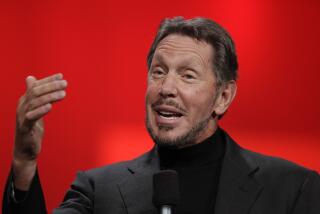COMPANY TOWN : British TV Company Carefully Wades Into Hollywood : Programming: With strategic investments, lesser-known Pearson is gaining critical mass.
- Share via
When Mike Medavoy launched his new film company Phoenix this month, alongside big Hollywood backers like Sony Pictures Entertainment was the lesser-known Pearson Television from Britain.
Though television is one of the smallest parts of Pearson’s $2.44-billion revenue, which includes Penguin Publishing and the Financial Times newspaper, it is the company’s fastest-growing division. Pearson Television’s rapid expansion has led it to Hollywood recently; a deal to buy telemovie distributor ACI for $40 million was completed last month.
Pearson, a public company listed on the London exchange with a market valuation of $5.4 billion, has been slowly shifting its focus toward entertainment over the past three years. It sold the china manufacturer Royal Doulton and oil company Camco in a bid to focus more on its three new core divisions: information, entertainment and education.
Following the restructuring, Pearson bought Mindscape (formerly Software Toolworks) but stumbled when Pearson Television was beaten by Rupert Murdoch to take over Hong Kong’s Star Television in 1993.
In January, veteran British television executive Greg Dyke became chief executive at Pearson Television and in 11 months has completed a slew of acquisitions.
“You have an aggressive new CEO coming in and making a few choice strategic investments and all of a sudden this company is developing a critical mass,” explains Jamie Bennett, president and CEO of ACI.
Pearson Television’s strategy under Dyke is to become one of the few British-based global television players by investing in programming.
Deals in which Pearson supplies programming in exchange for a stake in broadcasters have given Pearson positions in Britain’s newest terrestrial broadcaster Channel 5 and two European channels launched with the BBC.
The latest U.S. investments in ACI and Phoenix augment Pearson’s library with a valuable international currency--U.S. movies of the week. The value of television movies is rising as feature films become more exploited in home video and pay television.
ACI was formed in 1989 to take advantage of growing international markets by a group of eight television producers who make about a fifth of all network television movies. Pearson paid $40 million for ACI’s library of 150 titles and a seven-year deal for rights to ACI’s 20 productions a year.
Pearson already had a considerable library with Thames Television--Britain’s largest independent producer. Dyke added to this core when he bought Grundy International for $279 million last April. Game show and soap producer Reg Grundy’s business of reformatting its shows for international television is particularly valuable to Pearson. Grundy’s shows now appear in 17 countries.
“Grundy’s great trick is to produce low cost, high-rating programming tailored for individual markets, in whatever language is applicable,” Dyke said.
Dyke snatched the company just weeks before its stock was due to be floated publicly in U.S. financial markets.
“We started to look at the company and did it all in three weeks,” Dyke said. “Grundy was on a roadshow with Merrill Lynch around the U.S., and I was producing a television series, so I could only take one day off. I flew over to New York on Concorde in the morning, met Reg at JFK departures, and flew back in the afternoon after doing the deal.”
The $279-million price, after Grundy had been for sale a year earlier at $60 million, scared the British stock market. But Dyke is unfazed. “When people in the City [London’s financial center] tell me they think we paid too much for Grundy, I say, ‘I don’t give a damn what you think. You wait until you see the profits.’ ”
Dyke is something of a maverick in British broadcasting where he is best known for running the commercial channel London Weekend Television, which is part of the ITV Network, from 1990.
Pearson will size up further U.S. investments carefully. Dyke wants to avoid the mistakes made by British companies going Hollywood. He points to two 1980s examples--Thames Television’s investment in Reeves Entertainment and TVS buying MTM Entertainment.
Pearson itself was burned in the early 1980s with its investment in failed British film studio Goldcrest Films, the producer of “Chariots of Fire.”
“We see our development in the U.S. as slow and steady. I’ve watched a couple of British companies go into Hollywood and I would say we are doing these deals with more care. We will never be an American company.”
More to Read
The biggest entertainment stories
Get our big stories about Hollywood, film, television, music, arts, culture and more right in your inbox as soon as they publish.
You may occasionally receive promotional content from the Los Angeles Times.









